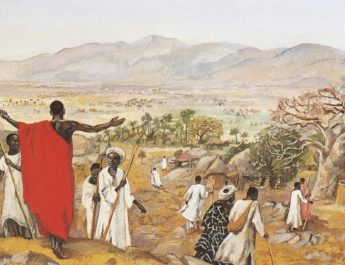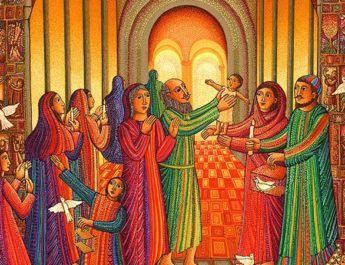John 10:11-18
Eastertide B22
BibleHub
11 “I am the goodA shepherd.B The good shepherd lays downC his lifeD for the sheep.E
Notes on verse 11
A “good” = kalos. This is good, noble, beautiful, correct, or worthy. This is external signs of goodness like beauty, demonstrations of honorable character, showing moral virtues. A different word, agathos, speaks of intrinsic good.
B “shepherd” = poimen. 18x in NT. This is shepherd or pastor – one who protects. It is also used figuratively to mean ruler.
C “lays down” = tithemi. This is to put, place, set, fix, establish in a literal or figurative sense. Properly, it is placing something in a passive or horizontal position.
D “life” = psuche. From psucho (to breathe, blow). This is breath, the breath of life, the self, individual, soul. This is the word for that which makes a person unique – their identity, will, personality, affections. This isn’t the soul as the immortal part of us, but as our individuality. It is also not life as a general concept, but specific to people. This is where the words psyche and psychology come from.
E “sheep” = probaton. Probably from probaino (to go forward literally or to advance in years); {from pro (before, ahead, earlier than, above) + the same as basis (a step, pace, foot); {from baino (to walk, to go)}}. This is literally easily led and so a sheep or another grazing animal. Also use figuratively of people who are led easily.
12 The hired hand,F who is not the shepherd and does not ownG the sheep, seesH the wolfI coming and leavesJ the sheep
Notes on verse 12a
F “hired hand” = misthotos. 3x in NT – here and in Mark 1:20 of the hired men with Zebedee. From misthoo (to hire for a wage, engage); from misthos (wages, pay, salary; reward, recompense, punishment; pay for services rendered in a literal or figurative way, good or bad). This is a hired servant or someone who works for a wage.
G “own” = idios. This is something that belongs to you or that is personal, private, apart. It indicates a stronger sense of possession than a simple possessive pronoun. This is where “idiot” comes from (denoting someone who hasn’t had formal training or education and so they rely on their own understanding).
H “sees” = theoreo. From theaomai (to behold, look upon, see, contemplate, visit); from thaomai (to gaze at a spectacle; to look at or contemplate as a spectator; to interpret something in efforts to grasp its significance); from theoros (a spectator or envoy). This is gazing, beholding, experiencing, discerning. It is looking at something to analyze it and concentrate on what it means. This is the root of the word “theatre” in that people concentrate on the action of the play to understand its meaning.
I “wolf” = lukos. 6x in NT. Perhaps related to leukos (bright, white); from luke (light). This is wolf or maybe jackal. Figuratively, it means cruel, greedy, or destructive.
J “leaves” = aphiemi. From apo (from, away from) + hiemi (to send). This is send away, release, permit, forgive, allow to depart, discharge, or send forth.
and runs awayK—and the wolf snatchesL them and scattersM them. 13 The hired hand runs away because a hired hand does not careN for the sheep. 14 I am the good shepherd. I knowO my own and my own know me, 15 just as the Father knows me and I know the Father. And I lay down my life for the sheep.
Notes on verses 12b-15
K “runs away” = pheugo. This is to run away in a literal or figurative sense. It can also be to flee, escape, shun, or vanish.
L “snatches” = harpazo. 14x in NT. Perhaps from haireomai (to choose, take); probably related to airo (raise, take up, lift, remove). This is to grab with force, seize, pluck, get through robbery, snatch up. This is taking something openly and violently – not subtly or in secret.
M “scatters” = skorpizo. 5x in NT. This is to scatter, distribute, dissipate, waste, cause to flee.
N “care” = melo. 10x in NT. This is to think about something, take an interest, to pay attention. It is to care or worry about something.
O “know” = ginosko. This is to know, recognize, realize, perceive, learn. It is knowledge gained through personal experience.
16 I have otherP sheep that do not belong to this fold.Q I mustR bringS them also,
Notes on verse 16a
P “other” = allos. This is other, another. Specifically, it is another of a similar kind or type. There is a different word in Greek that speaks of another as a different kind (heteros).
Q “fold” = aule. 12x in NT. Perhaps from the same as aer (air that we breathe); from aemi (to breathe or blow). This is a building that has a courtyard within it – an area that has no roof, but does have walls and is open to the air. It could also imply a palace or mansion as larger buildings that would include courtyards.
R “must” = dei. From deo (to tie, bind, compel; declare unlawful). This is what is necessary or proper. It is what is needed or what one should do – a duty or something inevitable. This refers to something absolutely necessary.
S “bring” = ago. This is lead, bring, carry, guide, drive, go.
and they will listenT to my voice.U So there will beV one flock,W one shepherd.
Notes on verse 16b
T “listen” = akouo. This is hear or listen, but it also means to understand by hearing. This is where the word “acoustics” comes from.
U “voice” = phone. Probably from phemi (to declare, say, use contrasts in speaking to shed light on one point of view); {from phao (to shine) or phaino (to bring light, cause to appear, shine, become visible or clear). This is a voice, sound, tone or noise. It can also be a language or dialect.
V “be” = ginomai. This is to come into being, to happen, become, be born. It can be to emerge from one state or condition to another or is coming into being with the sense of movement or growth.
W “flock” = poimne. Related to “shepherd” in v11. 5x in NT. Probably from poimen (see note B above). This is flock or fold in a literal or figurative sense – usually sheep or goats.
17 For this reason the Father lovesX me, because I lay down my life in order to take it up again. 18 No one takesY it from me, but I lay it down of my own accord. I have powerZ to lay it down, and I have power to take it up again. I have received this commandAA from my Father.”
Notes on verses 17-18
X “loves” = agapao. Perhaps from agan (much). This is love, longing for, taking pleasure in. It is divine love or human love that echoes divine love.
Y “takes” = airo. Perhaps relate to “snatches” in v12. See note L above.
Z “power” = exousia. From exesti (to be permitted or lawful); {from ek (out, out of) + eimi (to be, exist)}. This is power to act or weight. It especially denotes moral authority or influence. It can mean domain, liberty, freedom, capacity, mastery, right, force, or strength.
AA “command” = entole. From entellomai (to charge, command, give orders or instructions) {from en (in, on, at, by, with) + tellomai (to accomplish) [from telos (an end, aim, purpose, completion, end goal, consummation, tax; going through the steps to complete a stage or phase and then moving on to the next one)]}. This is an order, command, ordinance, or law. It focuses on the purpose of the command and its end result.
Image credit: “The Good Shepherd, 1900-1905, Arlington Street Church, Boston” – Tiffany window.




